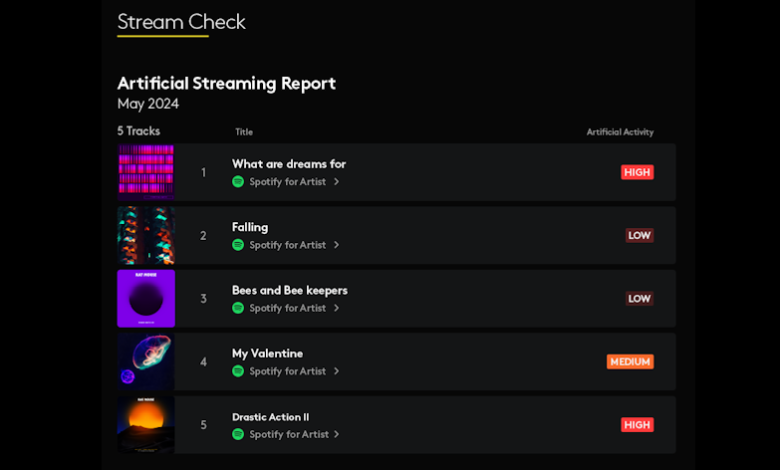Amuse launches ‘Stream Check’ feature to let artists know if their music is being used in streaming fraud

Music distributor and artist services company Amuse has unveiled ‘Stream Check,’ a new feature that lets artists know if their streams are being artificially inflated through streaming fraud.
“While there are plenty of bad actors who systemize streaming fraud, artificial streaming can also happen to artists who haven’t done anything at all,” said Erik Söderblom, Amuse’s Interim Chief Product Officer.
“An artist may cluelessly use a third-party promotion partner who turns out to be a bad choice, or legitimate tracks are added to a third-party playlist that utilizes bots without artists knowing, but the artist faces the penalties.”
Streaming data from DSPs can be difficult to access and interpret, leaving artists at risk of having their music removed from services, Amuse said in a statement issued on Tuesday (July 9), and Stream Check is designed to enable artists to identify the problem before their music is removed.
“Amuse is proud to offer artists a proactive solution that puts them in the driver’s seat with all the tools they need to monitor and protect their catalog and livelihood,” Söderblom added.
Sweden-headquartered Amuse says Stream Check differentiates itself from the sort of measures other distributors have taken by avoiding a “reactionary strike system,” instead teaching artists about the consequences of streaming fraud, such as financial penalties or having their music removed from streaming services.
Stream Check offers artists access to a panel where they can review their uploaded music. Each track has a color-coded status bar, reflecting the share of a track’s streams that were flagged as artificial by Spotify over the past month.
A status bar marked “low” means there’s little artificial activity, and no action needs to be taken. But an orange (“medium”) or red (“high”) bar indicates fraudulent activity, and Amuse offers artists access to a knowledge database to help them take action and restore their catalog to health.
Amuse spent years building an internal system to prevent streaming fraud, and collected years’ worth of monthly Spotify Withheld Streams reports, the company says.
“An artist may cluelessly use a third-party promotion partner who turns out to be a bad choice, or legitimate tracks are added to a third-party playlist that utilizes bots without artists knowing, but the artist faces the penalties.”
Erik Söderblom, Amuse
“Thanks to all of this groundwork, we developed the Stream Check feature in a matter of weeks,” said Louise Frodsham, Director of Customer Operations at Amuse.
“We are thrilled to unveil this feature to all artists who distribute their music through Amuse, and we look forward to continuing to educate and surface data that empowers them to fight this industry-wide problem.”
According to Beatdapp, a music data tracking company that offers streaming fraud detection tech to music companies, some $2 billion a year is siphoned from legitimate streams towards fraudulent activity.
Even as music distributors develop anti-streaming fraud technology, or partner with companies that can provide it, streaming services are taking action not only to detect streaming fraud, but to make it less lucrative.
As of this year, Spotify is paying out royalties under a new model that involves a minimum threshold for payments. A track uploaded to the platform has to be played a minimum of 1,000 times in the prior 12 months to qualify for a royalty payout.
Spotify has also instituted a minimum length of play-time for tracks in order for them to be included in royalty payouts.
Many observers say these moves will reduce the incentive to upload low-quality music or noise to the platform, in the hopes of racking up some streams.
However, that doesn’t address the kind of streaming fraud that Amuse’s Stream Check system is meant to address: The artificial inflation of streams of legitimate artists’ music.
To combat this problem, Spotify has also implemented another policy change: financial penalties for distributors, including labels, when fraud has been detected on their uploaded tracks.Music Business Worldwide
Source link

